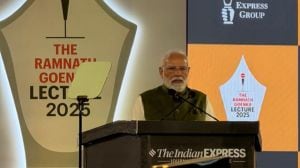At the Oscars, it is a Crash-course on how different folks can live together
In last week’s Economist there’s a short take on a Los Angeles Cardinal declaring that the priests would defy any law requiring ch...

In last week’s Economist there’s a short take on a Los Angeles Cardinal declaring that the priests would defy any law requiring churches to check the legal status of immigrants they assist. He denounced the “hysterical” anti-immigrant sentiment, and also argued for a humane policy.
By giving the best picture award to Crash, the Oscar Academy has thrown open the whole race relations thing, long confined to art-house and alternative cinema, into the mainstream. Set in Los Angeles, the film takes a searing look at how people can live in the same city without inhabiting the same space, and how, sometimes, it can literally and figuratively take a crash to shake up the layers, with unexpected and devastating results. The film’s melting pot has a pair of black jaywalkers stealing a wealthy white couple’s car at gunpoint; an affluent black couple getting stopped by a white cop and his pardner (the drunk wife is fingered while her TV producer spouse and the “nice” cop stand by helpless and humiliated); an Iranian storekeeper, misunderstood and mistrustful, nearly killing a little Hispanic girl; and Chinese, Puerto Ricans, Mexicans and others, all desperately trying to live the American dream.
First-time director Paul Haggis’s superbly assured movie may have been set in Los Angeles, but its theme can easily be transplanted to another city, another continent. It talks about how people who arrive from different cultures bring their baggage to a place far away from home. No one really likes leaving their roots; people do it when they are compelled to, when they have no choice. They come looking for a better, more comfortable life. And find no peace.
It is like Khaled Hosseini, author of the marvellous The Kite Runner, puts it when describing a proud Afghan immigrant’s feelings when he reaches the US: “Baba loved the ‘idea’ of America. It was living in America that gave him an ulcer.”
Crash could happen in Mumbai. Or in New Delhi. A politically connected young man can shoot a pretty bartender. In a streak of coincidences, a recent Bollywood film had the same germ of an idea: Taxi No 9211 may not be Oscar material, but it has a life-changing collision between a poor wrong-side-of-the-tracks taxi-driver, and a filthy-rich fellow whose only ambition in life is to become richer.
Crash nudged out favourite Brokeback Mountain, Ang Lee’s evocative movie adapted from a short story set in the sixties, about a pair of gay cowboys. It went into the Oscars nominated for eight awards and received three, including best director for Lee. When Brokeback released, there were fears that large swathes of conservative America would reject it on the basis of its theme: being flagrantly homosexual is still only fine among the Boho-chic circles in New York and San Fransisco, and perhaps Los Angeles. But it confounded the sceptics, becoming a resounding hit both at the box office and in people’s hearts.
The Academy carefully divvied up the top prizes between both movies, but made it clear that Crash was the better movie. The voters’ decision, which Oscar watchers had been predicting for the last couple of weeks, is a reflection of the changing times we live in. Questions about whether homosexuality is acceptable, and how one can have a win-win movie on this are almost passe now. What is more important, in the context of the race riots in Los Angeles, in France, everywhere else in the world, is cinema’s struggle to present, with as much engagement and conviction as possible, the whole question of how people can live together, minus conflict, with understanding.



- 01
- 02
- 03
- 04
- 05




























